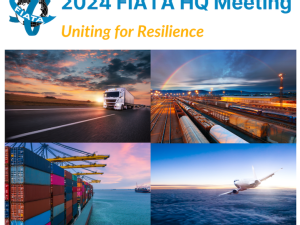Whilst reinforcing its commitment to endorsing and supporting efforts to continuously improve security in the international air cargo supply chain, the Group says it is concerned that a non-uniform approach to the implementation of requirements for new security measures could result in added bureaucracy, additional costs and unintended non-compliance in the aviation sector.
GACAG's comments are in responses to what it calls 'recent significant increases in the number of countries seeking to implement new security measures'.
Michael Steen, GACAG's Chairman, said: 'On too many occasions in the past, the air cargo industry has been left to manage the communication and implementation of new security measures with very little support from regulators. Some authorities also seek to further secure the air cargo supply chain by releasing ad-hoc directives without adequate time for consultation, resulting in regulations that the industry may not be able to fulfill. Whilst we are encouraged by the increasing level of collaboration between regulators and the air cargo industry, much more work needs to be done at a national level to ensure that, in this case, changes to security measures achieve their intended aim and do not overburden the vital role of our industry.'
GACAG says improving regulator-industry consultation and collaboration as well as identifying other means to increase industry awareness and participation is essential to strengthen national aviation security programs and to ensuring an orderly roll-out of new measures. In its position paper 'communications to industry from regulators regarding implementation of new security measures,' GACAG says countries seeking to introduce air cargo security measures should follow the requirements of ICAO Annex 9 (Facilitation) and Annex 17 (Security) to ensure the adoption of common global standards.
In non-emergency situations when there is sufficient time prior to such changes taking effect, new security measures should only be deployed and become mandatory when key conditions have been met. GACAG says these should include an appropriate period of dialogue with all air cargo supply chain stakeholders so they understand in advance what will be required of them in order to participate fully. Authorities should also have the capability to receive and provide timely responses to industry questions and concerns and, where appropriate, have conducted joint industry-government pilots to test and demonstrate the feasibility and provide feedback on proposed new regulations. GACAG also emphasizes that security measures need to balance the joint demands of security with trade facilitation.
In the event of an emergency situation, regulators should still endeavor to provide as much notice as reasonably possible, GACAG states.
In terms of communicating subsequent changes, the Group calls on authorities to clearly define and promote references to regulatory communication vehicles such as government websites and publications or to use whatever means is necessary to support the provision of pertinent information to the aviation and air cargo industry. It also says that authorities need to recognize the different segments of the air cargo industry and work with existing communications channels available via organizations such as the International Federation of Freight Forwarders Associations (FIATA), Global Shippers Forum (GSF), International Air Transport Association (IATA), The International Air Cargo Association (TIACA), Global Express Association (GEA) and relevant regional/local organizations, to reach as broad an audience as possible within each sector.











